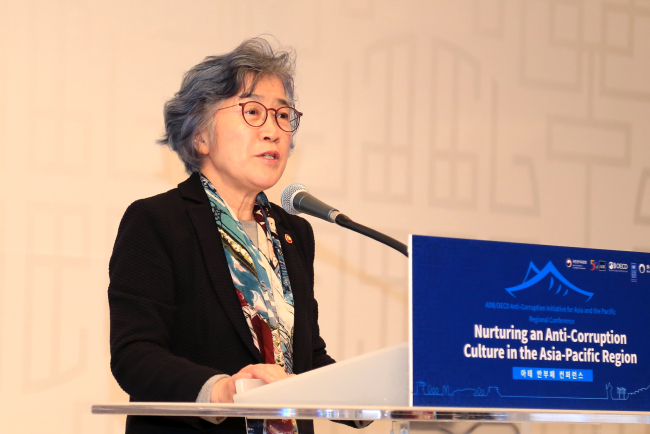The Anti-Corruption and Civil Rights Commission kicked off a three-day conference Wednesday in an effort to nurture a culture of compliance and transparency in the Asia-Pacific region.

Chairperson of the Anti-Corruption and Civil Rights Commission Pak Un-jong delivers her opening remarks at a three-day Regional Anti-Corruption Conference of the ADB/OECD Anti-Corruption Initiative for Asia and the Pacific at Millennium Seoul Hilton Hotel on Wednesday. ACRC
Initiated in the joint effort by Asia Development Bank and the Organization for Economic Cooperation and Development in 1999, the 9th regional conference of the Anti-Corruption Initiative for Asia and the Pacific has invited 31 member countries, including Cambodia and Vietnam, 350 officials from the member states and international anti-corruption agencies, the commission said.
The opening ceremony was attended by Prime Minister Lee Nak-yon, chairperson of the ACRC Pak Un-jong, head of Office of Anti-corruption and Integrity of ADB Clare Wee.
“We witnessed significant social changes following the implementation of the Improper Solicitation and Graft Act here, especially when the country overcame the recent political turmoil triggered by confidantes of the previous president,” said the ACRC chairperson Park in her opening remarks.
“Korea will continue to lead the role in spreading the anti-corruption culture in the Asia Pacific region,” she said, asking for other Asia-Pacific countries’ efforts in meeting public demand and desire for eradicating corruption. She also stressed the need to nurture a culture of integrity in the region.
The Improper Solicitation and Graft Act -- also known as the Kim Young-ran Law named after the former Supreme Court justice who first drafted it -- bars civil servants, journalists and teachers, as well as their spouses, from accepting meals and gifts worth more than 30,000 won ($27) and 50,000 won, respectively. It took effect on Sept. 28, 2016.
A recent survey showed that 9 in 10 Koreans said the law was effective, despite an ongoing debate on whether to raise the price ceilings.
At the following meeting of High Level Panel on Achievements and Challenges and Future Priorities for the Asia-Pacific, representatives of anti-corruption agencies will discuss case studies, achievements and future priorities for integrity strategies.
The meeting will also review the anti-corruption measures from both governmental and non-governmental perspectives.
During the Public Integrity Network meeting on Effective Anti-Corruption and Integrity Policies, Balazs Horvath, the director of the UNDP Seoul Policy Centre will give a speech on how a deep-rooted corruption has impeded human development, emphasizing the need to end corruption.
He will also present his view on how corruption has led to the public’s distrust in the government and politics.
The ACRC’s anti-corruption bureau Director General Ahn Junho will share the Korean government’s anti-corruption measures including operation of anti-corruption policy consultative council, punishment of five major crimes such as bribery, the prevention and punishment of corruption in the defense sector, and measures to end private sector corruption.
Preap Kol, executive director of Transparency International Cambodia, will also highlight the need for public-private cooperation as well as integrity-building in the public sector.
By Kim Da-sol (ddd@heraldcorp.com)



![[Herald Interview] 'Amid aging population, Korea to invite more young professionals from overseas'](http://res.heraldm.com/phpwas/restmb_idxmake.php?idx=645&simg=/content/image/2024/04/24/20240424050844_0.jpg&u=20240424200058)


